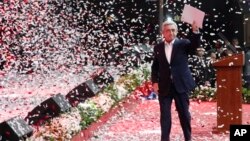Armenians are voting for president on Monday.
In a rarity for the former Soviet Union, Armenia will have a genuine multi-party contest.
But the race has been rocky for this landlocked nation of 3.2 million people in the southern Caucasus.
Of the eight original candidates, one has dropped out, a second refuses to vote, a third refuses to vote and is on hunger strike, a fourth was shot in an apparent assassination attempt, and a fifth fears arrest after Monday’s vote because he knew the suspected shooter.
Of the last three candidates, two were charging fraud, even before the first ballot was cast.
Polls indicate that voters, aching for stability and economic development, will vote heavily for the eighth candidate, President Serzh Sargsyan. His victory would give another five years to the already 13-year rule of his Republican Party.
"In many ways the outcome is fairly certain," said Richard Giragosian, director of the Regional Studies Center think tank in Yerevan. "The incumbent president, Serzh Sargsyan, is very likely to be re-elected to a second term, and largely as a reflection of a lack of a credible or viable contender or challenger. In other words, once again in Armenia, the political opposition was unable to unite behind a unified candidate."
This time the three strongest opposition parties not only did not unite, they decided not to field candidates.
The last time Armenians voted for president, in 2008, the country was so polarized that the election of Sargsyan sparked street fighting in central Yerevan. When the tear gas cleared, 10 were dead, hundreds were wounded and 150 were in jail.
Eduard Sharmazanov, deputy president and Speaker of Armenia’s National Assembly, said that this time the election will be the ‘cleanest’ since Armenia won independence from the Soviet Union 21 years ago. In comparison to the last presidential race, he said that all candidates have full freedom of assembly and access to television and radio.
Raffi Hovhannisian, a former foreign minister born in California, is expected to come in second on Monday. He said fraud is highly possible because about 700,000 Armenian citizens are on voter lists in the country, but work outside this impoverished nation.
"Those absent 700,000 citizens and the fact that their names are on lists, and are not separated from the resident Armenians, forms the basis for major fraud, for multiple voting, and for major problems that we have had in the past," he said.
Hovhannisian denounced as "Armenian math" the fact that 200,000 Armenians emigrated to find work outside Armenian since 2008, but during the same time electoral rolls expanded by 200,000 voters.
Another candidate, Andrias Gukasyan, voiced a common opposition charge, that the president is using the government machinery to ensure his reelection. Gukasyan, owner of a radio station, has spent the entire campaign on a hunger strike.
VOA found him across the street from Armenia’s parliament, camped in a tented marked in English and Armenian: "Stop the Fake Elections!" He charges that President Sargsyan is using government employees and government money to turn out the pro-government vote.
Gukasyan looks gaunt. He has lost 15 kilos during his hunger strike. To cheer him up, a traditional singer stopped by to fill his tent with song.
But another candidate, 63-year-old Paruyr Hayrikyan, saw no reason for levity. Two weeks ago, a man walked up and shot him in the right shoulder.
Hayrikyan spent years in Soviet labor camps, then in exile. He said he sees the hand of Moscow behind the attack. "It means that KGB agents are working," Hayrikyan said.
Despite the campaign jolts, the election seems to have generated little public interest.
"The only challenge to the government today is from a low voter turnout, reflecting a rather lackluster campaign where public interest and public engagement is rather less than usual," said Giragosian, the think tank director. "In other words, this is our least competitive election in Armenia’s recent political history."
For a race that started with eight competitors, Armenia’s election now looks predictable.







